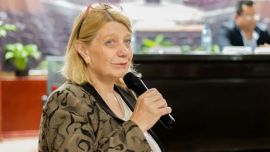President Mauricio Macri opened the 136th ordinary sessions of Congress on Thursday with an upbeat 40-minute speech which included the announcement of a debate on the controversial issue of abortion (as widely expected). In general, the speech aimed at breadth rather than depth, covering a wide range of areas (although glossing over some key issues).
The applause from the legislative audience (which incidentally did not include his predecessor, Senator Cristina Fernández de Kirchner) might serve as a rough guide to the speech’s highlights. The biggest applause came when he advocated equal pay for women and the most cautious (or limited) when he called for “respect and admiration” for the police.
Other popular points (in order of mention) were the disavowal of shock policies, a pledge of transparency, the announcement that the Campo de Mayo Army base would be converted into a national park, asking society to take notice of education beyond the collective bargaining season, debating abortion after 35 years of neglect and the claim that the economy is now on a firm footing.
Preceding his speech with a tribute to the 44 crew-members of the missing submarine ARA San Juan (officially describing their lives as “lost” for perhaps the first time), Macri began by thanking the country for its understanding of what he was trying to achieve, declaring “the worst is now over” and that continuous growth had begun. He then reaffirmed gradualism as the key to his aims of fighting poverty and better lives for Argentines – lowering inflation and the fiscal deficit every year would lead to less debt and more investment.
Macri claimed progress toward a more modern and transparent state with Internet replacing paperwork and hailed Argentina advancing from 106th to 85th in Transparency International rankings. The provinces now also understood that nobody can live beyond their means, he added.
Thousands of mortgages showed that the short-term thinking from 70 years of inflation was coming to an end, continued an upbeat Macri. A changing world was offering new opportunities and 260,000 new jobs had been created last year but the inclusion of informally employed third of the workforce should be a labour reform priority. His call for equal pay was accompanied by urging more paternity leave.
Macri saw tourism as a key (and also more federal) growth area, giving figures of six million foreign tourists, 50 million domestic flights and eight percent more hotel stays last year – better airports, roads and connectivity would all serve that end. .
Macri then moved onto security issues where he said democratic values were too often pitted against public safety. While raising his own experience of “bad cops” (his 1991 kidnapping by a police gang), Macri defended the security forces and said that the crime victims should be the heart of the issue. He claimed progress on that front with 20 percent less murders and 11 percent robberies in the last two years while calling for legal and judicial reforms replacing an outdated Criminal Code. Macri also proposed a crackdown on bad driving as well as crime, bemoaning 5,000 road accident deaths a year.
The president then eased into the abortion issue by dwelling on various problems affecting the already born – child obesity (the highest in Latin America with the fourth highest sugar consumption in the world) and the disappointing results in international scholastic aptitude tests from an unequal education system with too many dropouts.
To conclude, thr president returned to the economy with an upbeat picture – 11 percent more inflation, record cement and car sales and more jobs than in 2015. He also highlighted productivity agreements in various areas such as Vaca Muerta shale, the dairy industry and biotechnology. At the outset of his presidency, he had said that Argentina needed to grow for 20 straight years – that had been achieved last year at least and the bases had now been laid for changing for good.
VIDAL’S TURN
Buenos Aires province Governor María Eugenia Vidal meanwhile accused teachers of taking 4.7 million schoolchildren “hostage” while opening the provincial assembly on Thursday. Booed at times by opposition legislators, Vidal deplored negotiating with a tight deadline. The teachers are demanding a 19.5-percent pay increase against the 15 percent plus an attendance bonus offered by the provincial government. Vidal’s speech also highlighted legal reforms, the fight against drugtrafficking and social inclusion in low-income neighbourhoods. She also pointed out that 9,000 officers had been purged from the Buenos Aires provincial police. Parts of Vidal’s speech echoed Macri’s own state-of-thenation address earlier the same day, such as claiming that “the worst is now over.”




















Comments